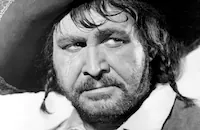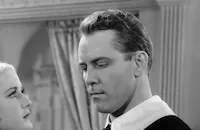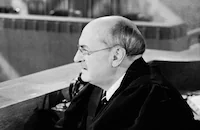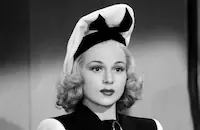Times Square Playboy

Brief Synopsis
Cast & Crew
William Mcgann
Warren William
June Travis
Barton Maclane
Gene Lockhart
Kathleen Lockhart
Film Details
Technical Specs

Synopsis
When New York stockbroker Vic Arnold becomes engaged to Beth Calhoun, he immediately invites his childhood friend from Big Bend, Indiana, P. H. Ben Bancroft, also known as Pighead, to be his best man. Vic can hardly wait to show off his fiancée and her family, but Ben is not impressed. He is convinced that the entire Calhoun family, Beth, brother Wally and their parents, are only interested in Vic's money. At first, Vic is puzzled by Ben's opinion, but when Ben accuses Beth, who is much younger than Vic, of keeping her former boyfriend, football player Joe Roberts, in the background, Vic angrily throws him out. Ben's wife Lottie is furious when she learns what happened and tries to make peace, but the rift is strengthened after the Calhouns visit the Bancrofts, only to be insulted by closed-minded Ben. Vic finally has to knock Ben out in order to force him to listen to the truth about the Calhouns, who are wealthy in their own right, and their talented children. Much damage has been done, however. Beth refuses to have Ben as best man, and Vic begins to believe that she really does still love Joe. Lottie convinces Ben that he is responsible for destroying his best friend's life, and finally contrite, he tricks the Calhouns into coming to Vic's apartment, where he patches things up between Vic and Beth and apologizes to everyone.

Director
William Mcgann
Cast

Warren William

June Travis

Barton Maclane

Gene Lockhart
Kathleen Lockhart

Dick Purcell

Craig Reynolds

Granville Bates
Dorothy Vaughan
Don Downen
Ferdinand Schuman-heink
John Elliott

Carol Hughes

George Andre Beranger
Milton Kibbee
Saul Gorss
Jack Richardson
Alma Lloyd
Shirley Lloyd
Allen Mathews
Iris March
Larry Kent
Leo White
Mitchell Ingraham
Crew

Film Details
Technical Specs

Articles
Times Square Playboy
P.H. Bancroft (Gene Lockhart) and his amiable wife Lottie (Kathleen Lockhart) arrive at Victor's luxurious penthouse apartment where they find him, in a scene modern day viewers may find strangely intimate, wrestling with his butler Casey (Barton MacLane). Victor dismisses Casey and proceeds to shower while joshing with P.H. before the two men head out for a night of carousing on the town. The pair heads to a swanky nightclub where Beth, under her stage name Fay Melody performs a mildly saucy number, "Looking for Trouble," and flirts with P.H. throughout.
Unmoored from his small town of Big Bend, and his far more sensible wife Lottie, P.H. becomes absolutely convinced Beth, her brother Wally (Dick Purcell) -- who works for Victor -- and their parents are born swindlers and are using Beth's marriage to Victor for material gain. The set-up is amusing, but more often excruciatingly embarrassing as P.H. openly accuses Beth, Wally and their father (Granville Bates) of being frauds. In P.H.'s small-town mind, the whole family just wants to jump on Victor's gravy train. When P.H. points to the Calhouns as being gold diggers a rift opens up between Victor and P.H.
Times Square Playboy was based on the play The Home Towners by stage legend George M. Cohan which opened at the Hudson Theater in 1926 and ran for 64 performances. The 1936 film version was directed by William McGann, and was originally called The Gentleman from Big Bend. It was proceeded by an early talkie, The Home Towners (1928) directed by Bryan Foy. And in 1940, another version of the stage play was made into a film, Ladies Must Live.
Warren William biographer John Stangeland called Times Square Playboy a "competent but lazy studio effort, typical of the lack of polish put into the actor's vehicles at this time." A review in The New York Times wasn't much kinder, calling the film, "a noisy comedy which manages to be alternately amusing and dull." The review did, however, call out the actors for commendation.
Though largely consigned to B-movies during her Hollywood career, June Travis made one of her most memorable screen appearances immediately before Times Square Playboy starring alongside James Cagney and Pat O'Brien in Ceiling Zero (1936). In an interesting twist, Gene Lockhart's wife Kathleen Lockhart played his onscreen wife, which gave their onscreen relationship a crackling veracity.
The production came at a particularly difficult time for star Warren William noted author Stangeland. Concerned that the script -- as written -- made him look too old, the then 42-year-old William campaigned to have a line removed that made him appear to be in his 50s or 60s. The production ground to a halt and a ferocious battle raged between the director McGann and producer Bryan Foy, both of whom refused to remove the line in question. Eventually after much heated debate, William got his way and the line was changed.
Director: William McGann
Screenplay: Roy Chanslor (screenplay); George M. Cohan (play)
Cinematography: L. William O'Connell
Art Direction: Esdras Hartley
Film Editing: Jack Killifer
Cast: Warren William (Victor 'Vic' Arnold), June Travis (Beth Calhoun, aka Fay Melody), Barton MacLane (Casey, Vic's Butler/Trainer), Gene Lockhart (P.H. 'Ben'/'Pig Head' Bancroft), Kathleen Lockhart (Lottie Bancroft), Dick Purcell (Wally Calhoun), Craig Reynolds (Joe Roberts), Granville Bates (Mr. Mort Calhoun), Dorothy Vaughan (Mrs. Nellie Calhoun).
BW-62m.
by Felicia Feaster

Times Square Playboy
Quotes
Trivia
Notes
According to a news item in Film Daily, June Travis replaced Anita Louise in the role of Beth. Working titles were Broadway Playboy and The Gentleman from Big Bend. Craig Reynolds was listed as Joe Reynolds on screen, but called Joe Roberts throughout the film. Gene and Kathleen Lockhart, who played the Bancrofts, were married in real life. This film is a remake of Warner's 1928 talking film The Hometowners, which used the Vitaphone process. It was directed by Bryan Foy (see AFI Catalog of Feature Films, 1921-30; F2.2562). Warners Bros. used the George M. Cohan play again as the source for their 1940 film Ladies Must Live, starring Wayne Morris, Rosemary Lane and Roscoe Karns and directed by Noel Smith.















